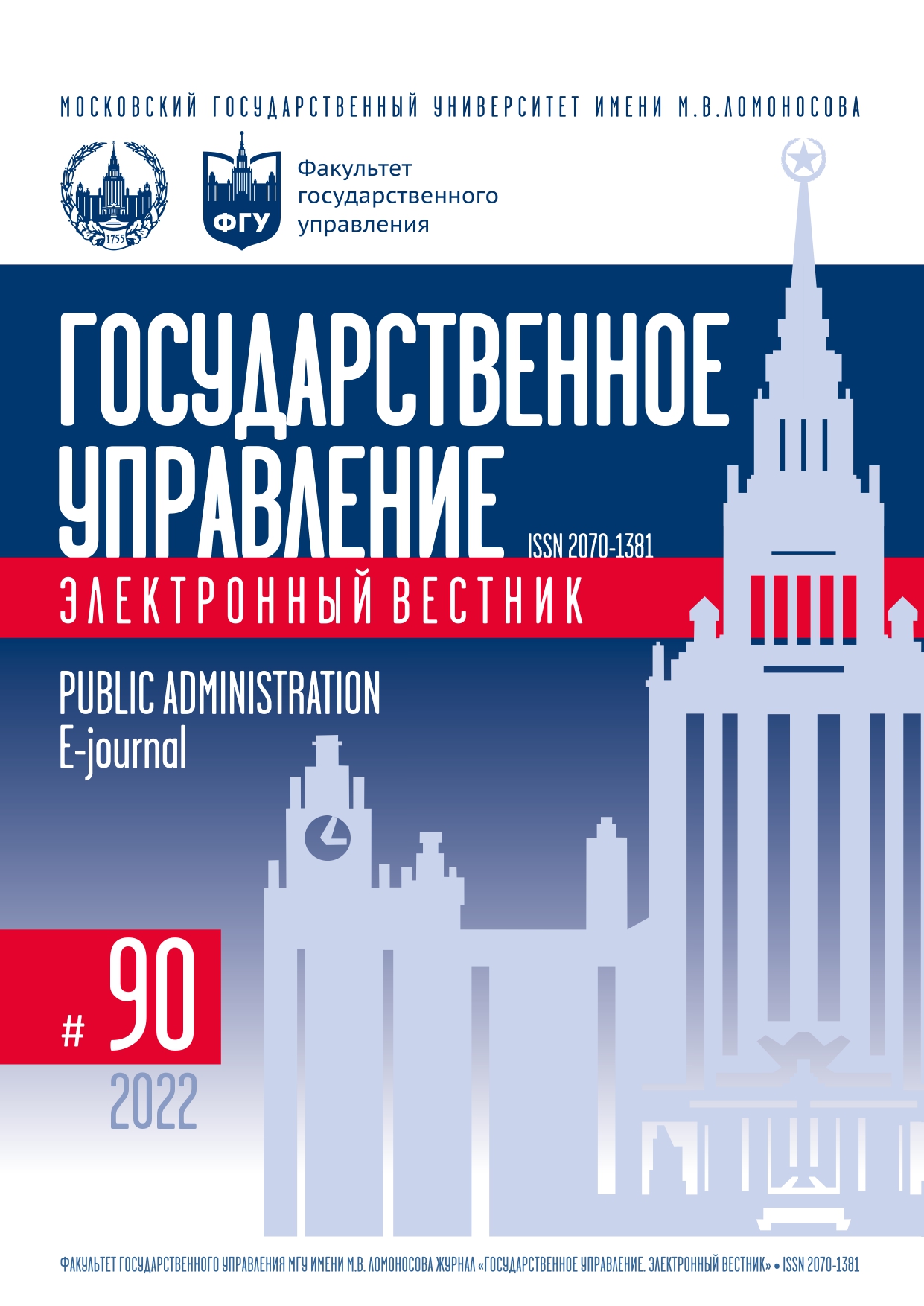Problem of Quasi-Civilization Projects in the Context of Nation-Building Tasks in Russian Federation
Keywords:
Civic nation, dual loyalty, collective historical consciousness, national and confessional identity, overlapping identity, Russian civilization, separatismAbstract
Quasi-civilization projects are a kind of ideological subversive activity, including those inspired from the outside, based on the dual loyalty of a part of Russians and aimed, ultimately, at the secession of some territories or even the collapse of Russia. National identity carries a huge political and social burden, is an overlapping identity, which is larger and wider than ethnic and confessional identity. Collective myths and their generally accepted interpretations in society become the foundation of principles that are designed to explain the fairness and expediency of cohabitation of political nation members. However, at the same time, this collective mythology can become the object of manipulations aimed at undermining national unity. A quasi-civilizational project can be understood as a complex of slogans and ideas about the possibility of a new state successful development on the territory of the actual state and at the expense of its territory and population. We are talking, first of all, about the denial of the existing project of a civic nation and the desire to create some new one in its place. This phenomenon became possible in the information society, since it does not grow out of really existing national liberation movements, but is a simulacrum of the national struggle. Such projects are present in the nationalist intellectual groups of some peoples of Russia, are fueled by the corresponding historical mythology and, as a rule, are closely monitored and worked out by foreign special services. If the idea of a Russian civic nation implies a supra-ethnic community, then the described quasi-civilization projects are dominated not by integration, but by segregation attitudes.
References
Буданов М.А. Меньшинства, диаспоры, малые группы: феномен двойной лояльности в русскоязычном информационном пространстве // Власть, информационные технологии, массовое сознание: основные тенденции современного политического развития. М.: АргамакМедиа М, 2017. С. 127–136.
Дробижева Л.М. Российская идентичность: поиски определения и динамика распространения // Социологические исследования. 2020. № 8. С. 37–50. DOI: 10.31857/S013216250009460-9.
Лосев А.Ф. Диалектика мифа. СПб.: Азбука-Аттикус, 2018.
Никовская Л.И. Гражданская идентичность как фактор консолидации российского общества: политико-управленческий аспект // Государственное управление Российской Федерации: вызовы и перспективы. Материалы XV Международной конференции «Государственное управление в XXI веке». М.: КДУ, «Университетская книга», 2018. С. 647–653.
Панарин А.С. Православная цивилизация в глобальном мире. М.: Эксмо, 2003.
Пушкарева Г.В. Идеи и ценности как способ конструирования символического пространства национальной идентичности // Полис. Политические исследования. 2017. № 5. С. 156–173. DOI: https://doi.org/10.17976/jpps/2017.05.11.
Тишков В.А. Национальная идея России. Российский народ и его идентичность. М.: АСТ, 2021.
Тишков В.А. Общество в вооруженном конфликте (этнография чеченской войны). М.: Наука, 2001.
Федоров С.Е., Филюшкин А.И. История и теория наций и национализма. СПб.: Издательство Санкт-Петербургского университета, 2016.
Хапизов Ш.М. Аварский народ и болмацI: борьба с пантюркизмом за право на существование. Махачкала: АЛЕФ, 2014.
Goode P. Russia’s Ministry of Ambivalence: The Failure of Civic Nation-Building in Post-Soviet Russia // Post-Soviet Affairs. 2018. Vol. 35. Is. 2. P. 140–160. DOI: https://doi.org/10.1080/1060586X.2018.1547040.
Gorenburg D. Regional Separatism in Russia: Ethnic Mobilisation or Power Grab // Europe-Asia Studies. 1999. Vol.51. Is.2. P. 245–274.
Semenenko I. Ethnicities, Nationalism and the Politics of Identity: Shaping the Nation in Russia // Europe-Asia Studies. 2015. Vol. 67. Is. 2. P. 306–326.
Shevel O. Russian Nation-building from Yel’tsin to Medvedev: Ethnic, Civic or Purposefully Ambiguous? // Europe-Asia Studies. 2011. Vol. 63. Is. 2. P. 179–202. DOI: https://doi.org/10.1080/09668136.2011.547693.
Zubrzycki G. The Crosses of Auschwitz: Nationalism and Religion in Post-Communist Poland. London, Chicago: University of Chicago Press, 2006.
Downloads
Published
Similar Articles
- Maxim A. Budanov, Constructivist Aspects of National Myth-Making in the Post-Soviet Space , Public Administration. E-journal (Russia): No. 94 (2022)
- Alexander Yu. Polunov, All-Russian Civic Identity: Conceptual Foundations and Regional Implementation , Public Administration. E-journal (Russia): No. 96 (2023)
- Varvara A. Sazhina, The Concept of «Russian Nation» and Formation of Civic Identity in the Perception ofthe North Caucasus Youth , Public Administration. E-journal (Russia): No. 97 (2023)
- Zoya R. Vysotskaya, Actualization of Identities among the Youth. Part 1: Problem Statement and Research Methodology , Public Administration. E-journal (Russia): No. 86 (2021)
- Zaur R. Gapizov, Цивилизационный идентитет населения Крыма как фактор интеграции в российское пространство , Public Administration. E-journal (Russia): No. 85 (2021)
- Maxim A. Budanov, Alexander Yu. Polunov, Fundamentals of the Strategy of the State National Policy of the Russian Federation and Improving the Conceptual Framework for Regulating Interethnic Relations , Public Administration. E-journal (Russia): No. 104 (2024)
- Irina S. Semenenko, Civilizational Identity and the Identity Politics Agenda: Russian Priorities in a Transforming World Order , Public Administration. E-journal (Russia): No. 104(S) (2024): The Concept of Russian Civilization: New Trends in Scientific Discussions
- Antonina V. Selezneva, Viktotia Ye. Zinenko, Youth Political Leadership in Institutional Dimension: Shaping Environment andDevelopment Features , Public Administration. E-journal (Russia): No. 87 (2021)
- Lyubov V. Ulyanova, The System of Social Sciences in the Context of Civilizational Approach: Formulating the Problem , Public Administration. E-journal (Russia): No. 104(S) (2024): The Concept of Russian Civilization: New Trends in Scientific Discussions
- Vladimir D. Milovidov, Civilization Approach in Economic Researches , Public Administration. E-journal (Russia): No. 104(S) (2024): The Concept of Russian Civilization: New Trends in Scientific Discussions
You may also start an advanced similarity search for this article.




